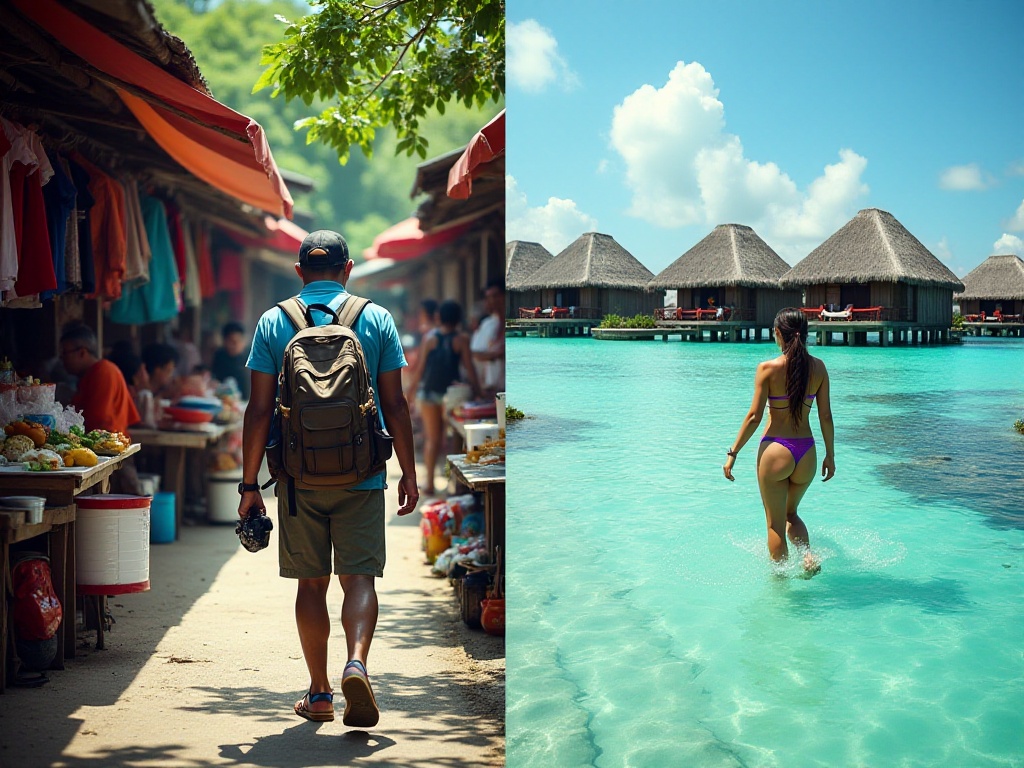Introduction
As a young professional just starting my career, I too went through a phase where I was intimidated by the high costs of international travel. It wasn't until I actually started planning and experiencing it that I discovered international travel wasn't out of reach with proper budget planning. After traveling to over 30 countries, I've developed a method for travel budgeting that's precise down to the penny, which I hope will help others facing similar concerns.
Essential Expenses
In my view, the core of any travel budget consists of unavoidable fixed expenses, which I call the "core trio": transportation, accommodation, and daily expenses. These form the foundation of your travel budget and require the most careful planning.
Transportation
Transportation is absolutely one of the biggest expenses in travel. Based on my years of travel experience, transportation typically accounts for 35-40% of the total budget. For a 7-day trip to the Kansai region of Japan, airfare alone costs 3,000-4,000 yuan. And that's without considering peak season price increases.
Regarding flights, I have some unique money-saving tips to share. First, timing is crucial when buying tickets. From my observation, booking international flights 45-60 days in advance usually gets you the best prices. Second, choosing the right departure city can save significant money. Last year, I tried taking a red-eye flight from Hangzhou to Tokyo with a transfer in Shanghai. While it required a connection, it was 2,000 yuan cheaper than a direct flight. Those savings were enough for several more days of travel in Japan.
Beyond international flights, choosing transportation after reaching your destination is also important. In Japan, I recommend purchasing a JR Pass (Japan Rail Pass). While the upfront cost seems high, it's definitely worth it if you plan to visit multiple cities. On my last trip to the Kansai region, I bought a 5-day Kansai Pass and saved nearly 1,000 yuan traveling between Osaka, Kyoto, and Nara.
Accommodation
Accommodation typically accounts for 25-30% of the total budget. Different accommodation choices can lead to huge budget variations. Taking Tokyo as an example, a capsule hotel costs 200-300 yuan per night; a business hotel runs 500-800 yuan; while a five-star hotel would cost over 2,000 yuan.
As a budget-conscious traveler, I particularly recommend business hotels in Japan. Though the rooms are small, these hotels offer excellent value for money. They're usually clean and well-located. The business hotel I stayed at in Ikebukuro last year is a perfect example - just 3 minutes from the subway station, surrounded by convenience stores and restaurants, all for just 450 yuan per night.
When choosing accommodation, location is as important as price. In my experience, business hotels in city centers typically cost 30% more than those in suburbs. However, when choosing suburban accommodation, you need to weigh transportation costs. If you stay too far away, the time and money spent on transportation might not be worth the savings.
For those wanting to experience local life more deeply, I also recommend trying guesthouses. Through platforms like Airbnb, you can find many reasonably priced and unique accommodations. I once stayed in a century-old machiya (traditional townhouse) in Kyoto. While the facilities weren't hotel standard, the experience of staying in the old city district was something no hotel could offer, and it only cost around 400 yuan per night.
Daily Expenses
Daily expenses mainly include three categories: food, transportation, and communication. This portion accounts for about 20% of the total budget but is most easily underestimated. You'll always encounter unexpected small expenses during travel, like suddenly wanting to try local snacks or needing to take a taxi.
In Japan, a SUICA or PASMO card (transit card) requires a deposit of 200-300 yen (about 10-15 yuan). A regular ramen set meal costs around 1,000 yen (about 50 yuan), while dining at an izakaya costs between 2,000-3,000 yen (about 100-150 yuan) per person.
I recommend budgeting at least 200-300 yuan per day for meals. This budget allows you to try local specialties without being too restrictive. For instance, a must-try sushi meal at Kuromon Market in Osaka alone costs over 100 yuan.
For communication, the most economical option now is buying a local data card. In Japan, a 7-day unlimited data card costs about 100-150 yuan. For longer stays, consider buying a local phone card - while the initial investment is higher, it's more economical in the long run.
Regarding local transportation, each city has its characteristics. In Tokyo, the subway is most convenient, but single tickets aren't cheap - consider buying day passes or multi-day passes. In Osaka, besides the subway, you might consider renting a bicycle, which saves money while providing a deeper local experience.

Additional Expenses
Activities and Experiences
Honestly, this part of the budget is hardest to estimate as it depends entirely on personal preferences. In Japan, for example, a Universal Studios ticket costs over 400 yuan, and if you want to try on a kimono for photos, that's another 300 yuan. Based on my experience, I recommend reserving 15-20% of your total budget for experiences and activities.
Last year, I participated in a matcha-making experience in Kyoto that cost 6,000 yen (about 300 yuan). While not cheap, the process gave me deep insights into Japanese tea culture, taught me the correct way to make matcha, and helped me meet friends from different countries - this kind of cross-cultural exchange experience is priceless.
Besides traditional cultural experiences, some modern entertainment options are worth trying. Like experiencing VR games in Akihabara or attending a robot restaurant show in Shinjuku. While these experiences might cost 200-300 yuan each, they create unique memories.
My advice is to be selective when choosing experiences. Rather than sampling many activities superficially, it's better to deeply experience a few that interest you most. This not only controls the budget but also provides higher quality travel experiences.

Shopping Budget
Shopping is often the biggest cause of travel budget overruns. Based on my experience, unless it's specifically a shopping trip, the shopping budget should be limited to 10-15% of the total budget. Of course, if shopping is your main purpose, this percentage can be increased accordingly.
I have several money-saving tips for shopping in Japan. First, prices often vary between duty-free and regular stores, so compare prices. Second, many department stores have seasonal discounts - you can save significantly if you catch these times. Third, discount stores like Don Quijote offer a wide variety of products at reasonable prices, perfect for buying souvenirs.

Precise Budgeting
Budget Creation
Let's create a specific budget example. Assuming you're planning a 7-day trip to Japan's Kansai region, let's calculate in detail how much money you'll need:
- Transportation Costs:
- International round-trip flights: 3,500 yuan
- JR Pass (5-day Kansai region): 1,200 yuan
-
Local transportation budget: 700 yuan (100 yuan/day) Subtotal: 5,400 yuan
-
Accommodation Costs:
- Business hotel 7 nights: 3,500 yuan (500 yuan/night)
-
Booking platform service fee: 100 yuan Subtotal: 3,600 yuan
-
Daily Expenses:
- Meals: 2,100 yuan (300 yuan/day)
- Data card: 150 yuan
-
Miscellaneous expenses: 350 yuan (50 yuan/day) Subtotal: 2,600 yuan
-
Activities and Experiences:
- Universal Studios ticket: 400 yuan
- Kimono experience: 300 yuan
- Matcha experience: 300 yuan
-
Other attraction tickets: 1,000 yuan Subtotal: 2,000 yuan
-
Shopping Budget:
- Personal shopping: 1,000 yuan
-
Souvenirs: 500 yuan Subtotal: 1,500 yuan
-
Emergency Reserve: 1,000 yuan
Total: 16,100 yuan
This budget is relatively practical, ensuring basic travel quality while maintaining some flexibility. Of course, specific amounts can be adjusted according to personal circumstances.

Money-Saving Strategies
Through multiple travel experiences, I've gathered some practical money-saving tips:
In Japan, convenience store food is not only cheap but delicious. I often have lunch at 7-11 or Family Mart, keeping meals around 30-40 yuan. Many attractions offer combination tickets, like the Osaka Amazing Pass, which saves on admission fees and provides special discounts.
For accommodation, choosing areas slightly away from city centers but with good transportation access usually saves 20-30% on room rates. For example, in Osaka, staying in Tennoji area instead of Namba is much cheaper while maintaining good accessibility.
Remember one important principle: saving money isn't the goal - spending money wisely is key. For instance, while you can economize on accommodation, always choose places with convenient transportation access. This saves both time and transportation costs. When choosing attractions, rather than rushing through many places, it's better to select a few must-see spots and explore them thoroughly.
Finally, I want to emphasize that travel budgeting isn't about maximum savings. Reasonable budget planning should be based on personal financial capacity and travel purposes. Sometimes spending a bit more money might bring lifelong memorable experiences. The key is ensuring every penny spent is worthwhile - that's the true essence of travel budgeting.
Do you have your own travel budgeting insights? Feel free to share in the comments. If you found this article helpful, don't forget to save it for future reference.


